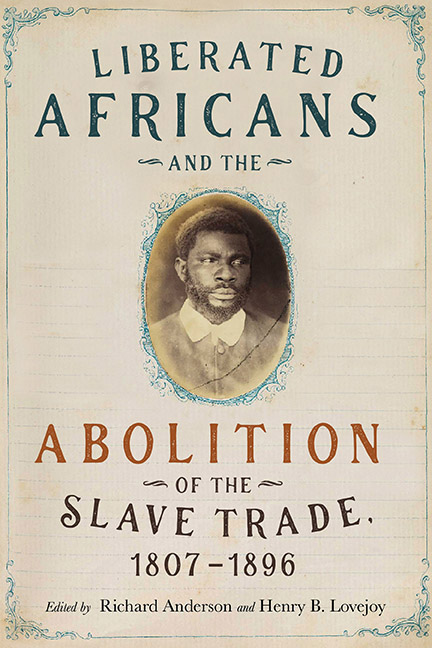Book contents
- Frontmatter
- Dedication
- Contents
- List of Illustrations
- Acknowledgments
- Introduction: “Liberated Africans” and Early International Courts of Humanitarian Effort
- Part One Origins of Liberated Africans
- Part Two Sierra Leone
- Part Three Caribbean
- Part Four Lusophone Atlantic
- Part Five Liberated Africans in Global Perspective
- Part Six Resettlements
- Bibliography
- Notes on Contributors
- Index
6 - Ali Eisami's Enslavement in Jihad and Emancipation as a Liberated African
Published online by Cambridge University Press: 21 March 2020
- Frontmatter
- Dedication
- Contents
- List of Illustrations
- Acknowledgments
- Introduction: “Liberated Africans” and Early International Courts of Humanitarian Effort
- Part One Origins of Liberated Africans
- Part Two Sierra Leone
- Part Three Caribbean
- Part Four Lusophone Atlantic
- Part Five Liberated Africans in Global Perspective
- Part Six Resettlements
- Bibliography
- Notes on Contributors
- Index
Summary
Many of the individuals who left the Bight of Benin in the first several decades of the nineteenth century were enslaved during events related to the jihad that swept the interior after 1804. One of the complaints that led to the outbreak of the jihad was the enslavement of Muslims and their sale into the transatlantic slave trade. The reaction to the perceived injustices of freeborn Muslims not only being enslaved but subsequently being sold to Christians was first apparent in the Senegambia region, while the most pronounced manifestation of the response led to the formation of the Sokoto Caliphate after 1804. The issues were hotly contested among Muslims not because Muslims wanted to participate in the transatlantic slave trade but because Muslims disagreed over the need for jihad. The issue came to a head in the disagreement between the leadership of the Sokoto jihad and the established Muslim governments that were challenged in the course of the jihad. All the Hausa governments and many others were overthrown, whether or not their regimes were Muslim, because they were considered lax in their protection of Muslims. The case of Borno was particularly sensitive and led to violent confrontation between the established Muslim regime of the Sayfawa dynasty and the belligerent proponents of jihad who sometimes moved aggressively beyond easily defensible positions in accordance with the tenets of Islam. In the Borno case, jihad erupted within its sphere of influence in a manner that proved a difficult challenge to the Muslim leadership of both the emerging jihad state centered at Sokoto and those who criticized its perceived excesses.
In this chapter I focus on one individual, Ali Eisami Gazirmabe of Borno, or William Harding (figure 6.1), as he was known in Sierra Leone, including how and when he was enslaved and his explanation of the impact of the jihad on his family, his society, and his country. In the context of research on liberated Africans more generally, my approach is strictly biographical. The details contained in the registers of liberated Africans, the process of condemning ships before courts of mixed commission, or in this case the court of vice-admiralty that preceded the courts of mixed commission in Sierra Leone, the identification of ships, and, most important, establishing who was on particular ships are only details that are important in reconstructing the life stories of individuals.
- Type
- Chapter
- Information
- Publisher: Boydell & BrewerPrint publication year: 2020



